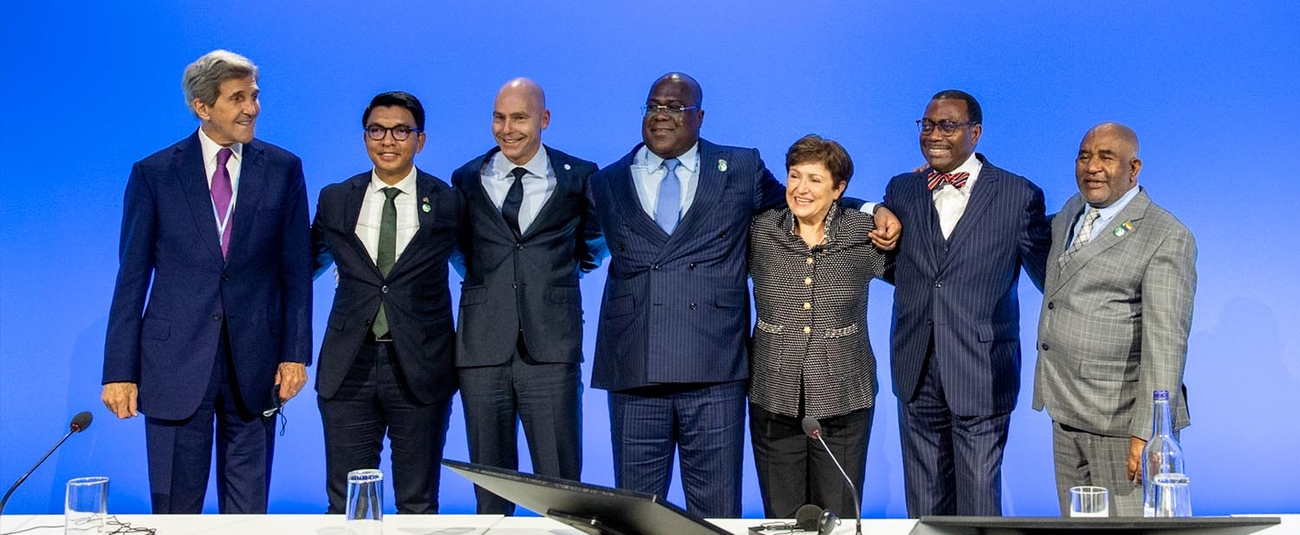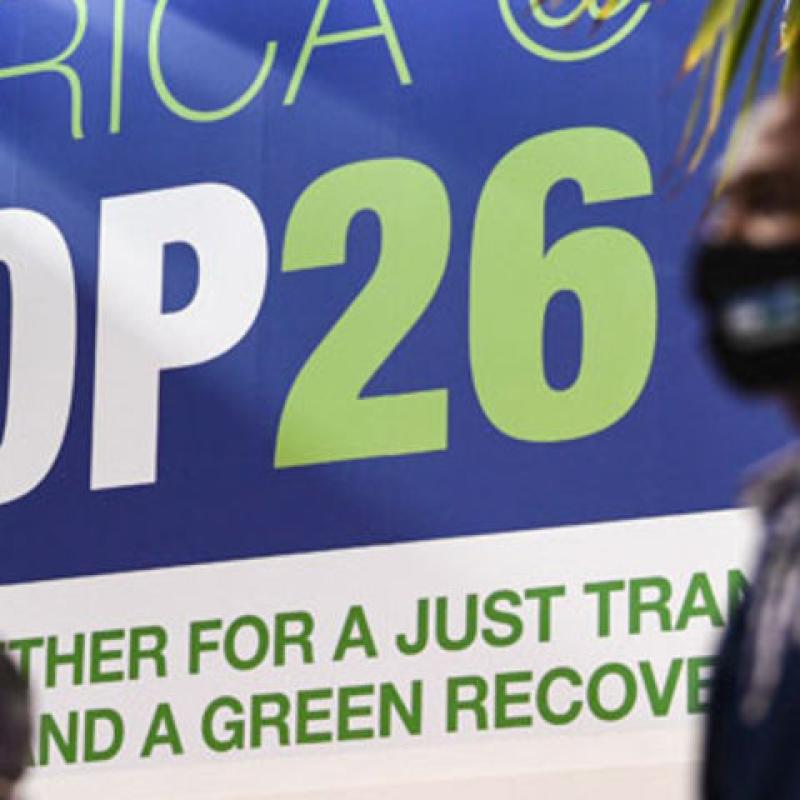
AAAP in the Media
Displaying 1 - 4 of 4
UK gives Africa $197 million to mitigate climate change
Youth Adaptation Solutions Challenge Francophone Cohort
The Youth Adaptation Solutions Challenge is an annual competition and awards program for youth-led enterprises (50% women-led) organized by GCA and AfDB as part of the Youth Adapt Flagship Program.
The competition invites young entrepreneurs and Micro, Small and Medium-sized Enterprises in Africa to submit innovative solutions on climate adaptation and resilience. The winners will be part of a 1-year incubator program, which will provide tailored training on business development and adaptation, coaching, networking opportunities, and grants to enable the youth-led enterprises to scale up their innovative businesses and build resilience among marginalized communities in Africa
The objective of the project is to deliver business development services (BDS) to and build the institutional capacity of youth-led enterprises, positioning them to effectively utilize grants offered and to also mobilize additional private capital, scale up climate action and create employment opportunities on the continent.
- Build youth capacity for employability and unlocking access to finance
- Deliver a 1-year incubator program tailored training on business development and adaptation
- Provide coaching and networking opportunities
- Equip young innovators and MSMEs with customized skills and resources to scale up climate adaptation innovations and boost the creation of jobs
- Grant disbursement to the 5 winners of the YouthADAPT winners
- 12-weeks training with practical skills in entrepreneurship and business development and climate adaptation
- Mentorship to enable the winners to execute their business plans, create jobs, and support the continental effort towards climate resilience
- Training materials developed and training workshops delivered tailored to the selected youth-led start-ups
- Support to the youth led-businesses to develop and implement their business plans and to mainstream adaptation and climate resilience in their businesses
- Delivered business development services (BDS) to and building the institutional capacity of youth-led enterprises
- Youth-led enterprises positioned to effectively utilize grants offered and to also mobilize additional private capital
- Scaled up climate action and ability create employment opportunities on the continent
USD 500 Million
African, other world leaders gather for largest summit on climate adaptation at COP26

African and other global leaders came together at COP26 in Glasgow yesterday for the Africa Adaptation Acceleration Summit, the largest summit to date on climate adaptation.
The summit called for the rest of the world to ramp up its support for the African continent as it adapts to the adverse effects of climate change, including devastating human impacts in Madagascar, where 1.3 million people live under food distress following four years of no rain. Madagascar’s situation has been described as the first climate induced drought.
President Félix Tshisekedi of the Democratic Republic of Congo and Chairperson of the African Union led Tuesday’s event. He highlighted the $6 billion in financial commitments for climate adaptation that African countries had put forward in their nationally determined contributions (NDCs) and called for increased funding to produce the additional $27 billion a year that the continent requires.
President Tshisekedi said: “Adaptation finance flowing to Africa is grossly insufficient compared to the enormous resources needed for the continent to adapt to climate change. That is why African countries, working with the Global Center on Adaptation, the African Development Bank, and other partners, launched the Africa Adaptation Acceleration Program (AAAP). The program lies at the heart of Africa’s climate change needs. It is Africa-owned and Africa-led. African nations have endorsed it as Africa’s preferred mechanism to deploy adaptation finance for adaptation projects in Africa.”
African Development Bank Group President Dr Akinwumi A. Adesina said: “The Africa Adaptation Acceleration Program is a game changer for Africa to deliver results and impacts on adaptation, fast and at scale. It will support 30 million farmers with digital climate advisory services. The Technologies for African Agricultural Transformation program supported by the African Development Bank and the Bill and Melinda Gates Foundation has already delivered climate resilient technologies for 11.2 million farmers in just two years.”
He added: “With the Africa Adaptation Acceleration Program, we expect to reach 40 million farmers. We plan to support farmers in producing 100 million metric tons of food, which will be enough to feed 200 million people and reduce hunger by 80%.”
Moderating summit proceedings, Patrick Verkooijen, CEO of the Global Center on Adaptation, underscored the urgent need for accelerated climate adaptation action across the continent: “COP26 must deliver on the promises of Paris,” he said. “We are failing and we are failing Africa. We must bring more ambition and more finance to help Africa adapt to the pace of a climate emergency devastating the continent with increasingly serious consequences for the world’s poorest and most vulnerable,” the GCA CEO added.
COP26 President Alok Sharma announced $197 million in new funding for adaptation for Africa from the UK government. Of this amount, $27 million will support the Africa Adaptation Accelerated Program upstream facility to deliver technical assistance and a pipeline of bankable projects. The package is expected to unlock almost $1.2 billion for climate adaptation in Africa. Sharma said there will be more to come.
US Secretary of State Antony Blinken also announced new funding for climate adaptation from the United States government. He said the US President would work with the US Congress to dedicate $3 billion annually in adaptation finance by the year 2024. This is the largest commitment ever made by the US to reduce the impact of climate change in those most endangered by it around the world.
Project to Support a Resilient Agriculture Value Chain Development in Congo and DRC (PRAFS)
The Republic of Congo (ROC) and the Democratic Republic of Congo(DRC) are 2 of the 6 countries that make up the Congo Basin – an area with the second largest tropical rainforest in the world. These two countries are therefore, home to a huge diversity of plants and animals that span across a variety of landscapes (including a mosaic of rivers, forests, savannas, swamps and flooded forests). The area has a huge agrosylvo-pastoral and fishery production potential, and is a vector for the promotion of the agroindustry as well as for creating benefit leading to a strengthening of the rural economy.
The objective of this project is to ensure that the existing agricultural landscape is better able to support any potential increase in demand for land and water resources while simultaneously ensuring an effective resilience to climate change. This should minimise the need for expansion of farmland into existing forest landscapes thereby avoiding forest degradation, deforestation, thereby reducing emissions and enhancing forest carbon stocks. The project includes three main components: (i) Enhancing the sustainability of agricultural landscapes; (ii) Capacity building, awareness raising and dissemination; and (iii) project coordination and management.
- Feasibility study on integrating DCAS into agricultural extension and design of the agrometeorological advisory flow and required investments for successful scaling up of advisory to small-scale farmers
- Identification of capacity building and enabling interventions to ensure uptake by of DCAS
- Training of producer organisations in the appropriate use of selected technologies
- Collaborating with ICS producers within the country to train female producer organisations in the production and distribution of improved cooking stoves
- Pilot study undertaken to test the potential of developing smoke-flavored products working with the local fish research institute
- Provision of 15 solar drying systems to 15 improved maize planting material producer groups of to facilitate the post-harvest processing and storage
- Provide 100 cassava producer groups with solar drying systems to facilitate processing and storage and bio
- Training of 60 farmer field school facilitators
- Establishment and running of farmer field schools
- 2 355 000 beneficiaries, which make up 2.5% of the population
- Enhanced abilities of regional and local-level decision-makers to promote appropriate agroforestry-based climate resilient technologies
- Promotion of increased climate resilient agricultural production landscapes using innovative technologies
- Promotion of producers, women and youth’s organizations
- Capacity development of personnel involved at different levels of planning and execution of agroforestry schemes and the farmers
- Strengthened institutional capacities to improve ecosystem services through agroforestry and enhance the climate-resilience of production landscapes
- Local communities, farmers and farmer groups trained in the management of climate-resilient agroforestry landscapes
- Use of energy efficient technologies for post-harvest processing promoted
USD 217.6 Million

